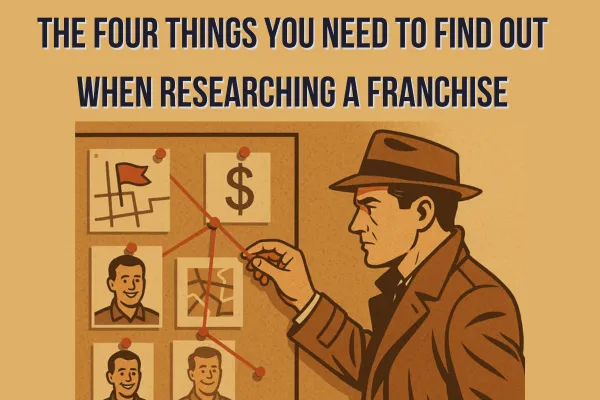
The Franchise Detective’s Guide: 4 Clues That Prove You’ve Found the Right Business
What Do You Really Need to Know When Investigating a Franchise?
All the research you do when considering a franchise should focus on four essential points. It’s equally important to notice what you don't find as it is to see what you do. If you confidently understand these four elements, you can move forward with certainty. If not, it means you need deeper research. Often, difficulties arise because you're asking the wrong questions, speaking to the wrong people, or trying to handle tasks better left to experts. At Tracer Franchising, we ensure you ask the right questions, to the right people, at the right time.
1. Will this franchise help me reach my long-term goals?
Usually, these goals revolve around finances and lifestyle. For example: How much will I need to work each week, and how much money can I realistically expect to earn?
2. Do my skills align with what this franchise requires?
Every business owner needs determination, strong communication skills, grit, and a good work ethic. However, each franchise demands specific skills or personality traits.
Identify the traits critical for success in the franchise. It might be sales, management, operational skills, or another ability. Objectively assess if these align with your strengths.
3. Is my chosen territory suitable for this franchise?
Usually, the answer is yes, because great franchisors won't allow franchisees to open in bad locations. This is most readily apparent when skilled franchisees buy out their neighbor and turn poorly performing territories into successes. But some areas naturally align better with certain business models.
For instance, a residential window and door franchise might struggle in densely populated urban areas. Mobile franchises may not perform well in rural areas due to long drive times between jobs. Pest control franchises typically perform better in areas like the Southeast rather than in Southern California.
4. Do I like and trust the franchisor?
Remember, you'll sign a contract lasting 7–10 years. Even if the business model is solid, a poor relationship with the franchisor can lead to dissatisfaction.
Occasionally, you'll disagree with the franchisor’s directions. Trusting their judgment enough to follow their advice—even when it differs from your preference—is crucial.
The process truly is this straightforward:
Talk to existing franchisees to see if their lifestyles and skills match your own.
Create financial models to confirm you have the resources needed to become profitable and that the franchise’s financial structure makes sense.
Engage with the franchisor to ensure you trust and like their leadership.
Conduct your own territory research or invest in a professional feasibility study.
Have legal and financial experts review documents to protect your interests.
What isn’t necessary?
Fully mastering every aspect of the industry
Extensive training and ongoing support provided by the franchisor make exhaustive industry knowledge unnecessary upfront.
Having prior experience or direct knowledge of the franchise’s specific tasks
Most franchises prefer owners without industry-specific experience to avoid ingrained "bad habits."
Being passionately invested in the franchise’s industry from day one
While you should not dislike the business, initial passion isn't required. Interest and a willingness to learn typically lead to genuine enthusiasm over time. Consider the franchise as a means to secure financial freedom, allowing you to pursue other passions later.
Understanding every minor operational detail
You should confirm the effectiveness of technology, marketing strategies, and equipment costs without getting bogged down in specifics. Ask existing franchisees about these areas: Does technology help their operations? Is the marketing consistently successful? Does equipment investment quickly pay off? If these elements consistently deliver value, detailed knowledge of vendors or mechanisms is unnecessary.
Conclusion
This diligent process typically takes several months, ensuring you make a wise, informed decision. Fortunately, going through these steps involves no cost or legal commitment—just your dedication and time.
Tracer Franchising will guide you through every step, from matching you with franchise opportunities that fit your goals and traits to providing clear guides for understanding the Franchise Disclosure Document (FDD). We equip you with insightful questions for franchisors and franchisees and connect you with trusted outside experts for funding, legal reviews, territory feasibility, and financial planning.
Deciding to invest in a franchise shouldn't be a solitary journey. Even though the final decision criteria seem straightforward, the path can become complex. That’s why we emphasize thorough education, precise matching, and reliable research tools—so you find the franchise that truly fits you.
